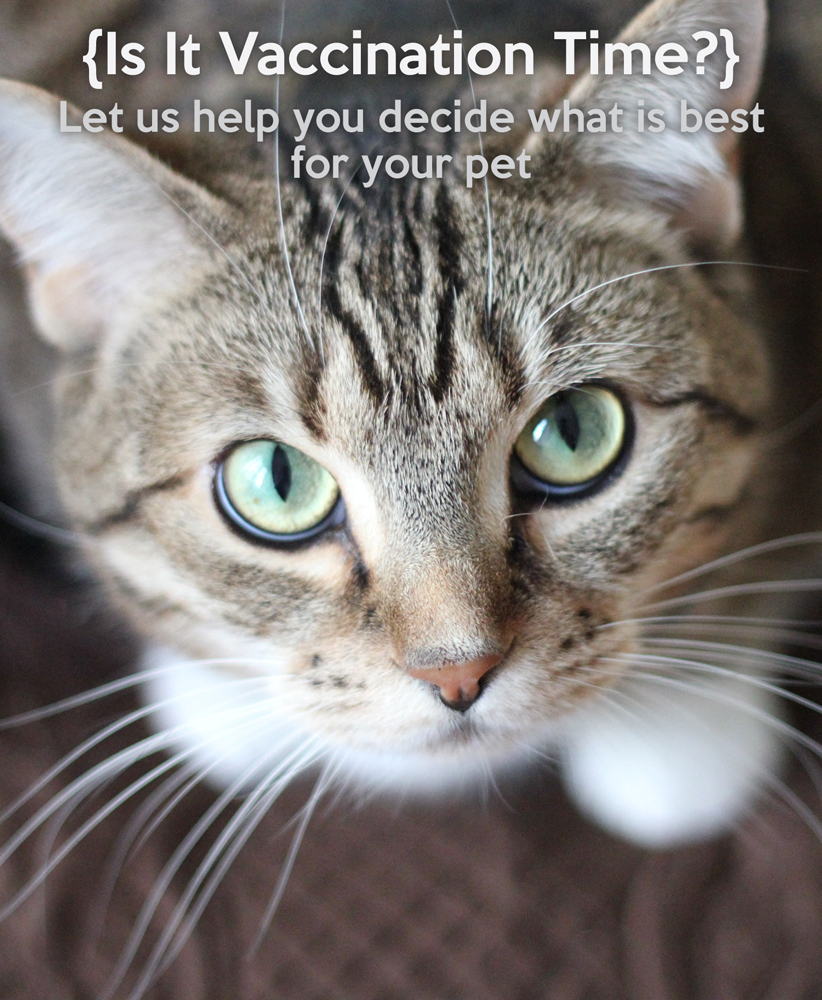Vaccinations for Cats
Vaccinations are the most important preventive measure you can take for the health of your pet. Health threats vary from city to city and even in various sections of cities. Therefore, we can tailor an immunization program for your pet based on local conditions. Your dog or cat generally can be immunized for the following diseases: Dogs can be immunized against distemper, hepatitis, leptospirosis, parainfluenza, parvovirus, coronavirus, Bordetella, rabies, and Lyme disease. Cats can be immunized against feline panleukopenia (distemper), rabies, feline rhinotracheitis, calicivirus, chlamydia, feline leukemia, and FIP.
In recent years some veterinarians have changed their recommendations regarding the frequency of vaccinations. The following fact sheet provides answers to important questions concerning vaccinations.
My whole life I have been told my pet needed yearly vaccinations. What has changed?
First you need to know that veterinarians have always acted in what they believed to be the best interest of pets and pet owners. Vaccines against infectious diseases have done much to reduce sickness and death in companion animals. The tradition of annual boosters was based on manufacturers’ recommendations and labeling. To date, few studies have been done to prove how long vaccines are effective. In addition, veterinarians found vaccination to be a safe procedure that was generally free of side effects and risk. Recently, there has been a growing degree of evidence indicating protection from vaccination is longer lasting than previously believed. In addition, there is increased awareness and concern that vaccination is not as harmless a procedure as once thought. This awareness and concern have led to a growing number of authorities (such as infectious disease experts, immunologists, and researchers) as well as practitioners who recommend reduced frequency of vaccinations while at the same time tailoring vaccine recommendations to specific risk situations.

Is vaccinating my pet a risk to his or her health?
Vaccination against disease is a medical procedure and, like all medical procedures, carries some inherent risk. As in any medical procedure or decision, the advantages must be balanced against the risks. Veterinarians recommend that no needless risks should be taken and that the best way to accomplish that is to reduce the number and frequency of administration of unnecessary vaccines. As is the case with any medical decision, you and our veterinarian should make vaccination decisions after considering your pet’s age, lifestyle, and potential exposure to infectious diseases.
What possible risks are associated with vaccination?
– Again, severe reactions are uncommon, but any needless risk is unacceptable. In general, vaccine reactions and side effects (such as local pain and swelling) are self-limiting. Allergic reactions are less common, but if untreated can be fatal.
– In a small number of patients, vaccines can stimulate the patient’s immune system against his or her own tissues, resulting in diseases that affect the blood, the skin, the joints, or the nervous system. Again, such reactions are infrequent.
– In a tiny percentage of cats, there has been an increase in a particular form of tumor that is strongly associated with vaccine administration. The reported incidence of this side effect is one in 10,000. Researchers are currently studying this phenomenon to learn what causes the problem so that vaccines can be redesigned to avoid this unacceptable side effect. Meanwhile, reducing risk by reducing the number of unnecessary vaccines given to cats is the safest option.